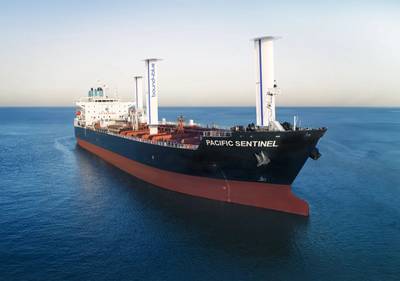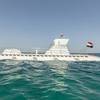Eastern Pacific Shipping to Equip Pacific Sentinel with eSAIL Wind Propulsion System
Eastern Pacific Shipping (EPS) has signed a contract for its first ever wind-assisted propulsion system, partnering with bound4blue to install three 22-metre eSAILs onboard the Pacific Sentinel.
The turnkey ‘suction sail’ technology, which drags air across an aerodynamic surface to generate propulsive efficiency, will be fitted in fourth quarter of 2024.
The wind-assisted propulsion technology is expected to help the 183-metre, 50,000 DWT oil and chemical tanker reduce overall energy consumption by approximately 10%, depending on vessel routing, according to the companies.
“It’s exciting to secure our first contract in Singapore, particularly with EPS, a company known for both its business success and its environmental commitment. We see the company as a role model for shipping in that respect. As such this is a milestone development, one that we hope will pave the way for future installations across EPS' fleet, further solidifying our presence in the region,” said José Miguel Bermudez, CEO and co-founder at bound4blue.
Working with existing propulsion systems on the Pacific Sentinel, the three eSAILs will use an autonomous control system to optimize power and reduce engine load and fuel consumption, with no need for crew input and low maintenance requirements.
“Over the past six years, our investments in projects including dual fuel vessels, carbon capture, biofuels, voyage optimization technology and more have allowed us to reduce our emissions intensity by 30% and achieve an Annual Efficiency Ratio (AER) of 3.6 CO2g/DWT-mile in 2023, outperforming our emission intensity targets ahead of schedule. The addition of the bound4blue groundbreaking wind assisted propulsion will enhance our efforts on this path to decarbonize,” said Cyril Ducau, Chief Executive Officer at EPS.
Pacific Sentinel will achieve a ‘wind assisted’ notation from class society ABS once the eSAILs are installed. The technology will help ships to comply with existing and upcoming regulations like improving EEDI and EEXI, enhancing its CII rating, and contributing to saved allowances within the EU Emissions Trading Scheme.













